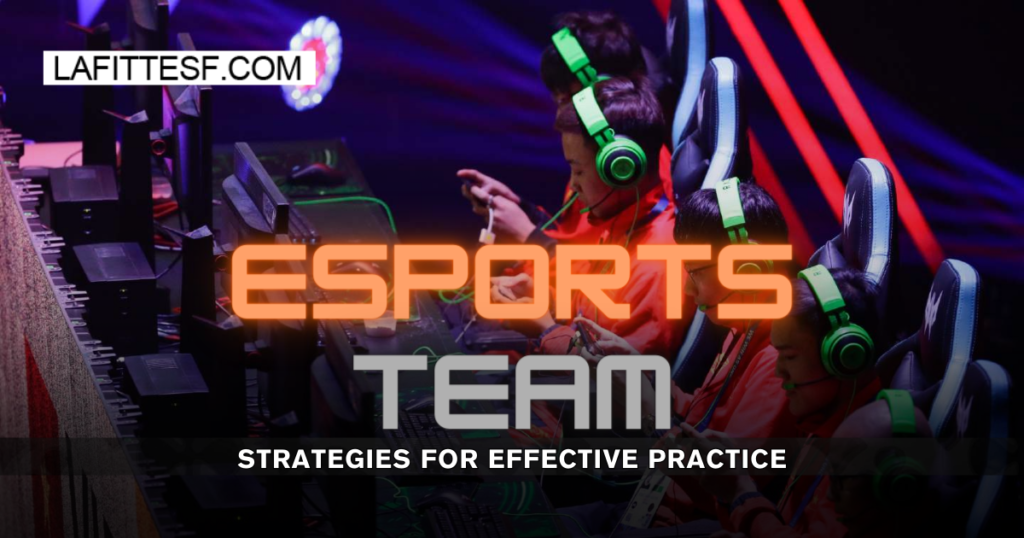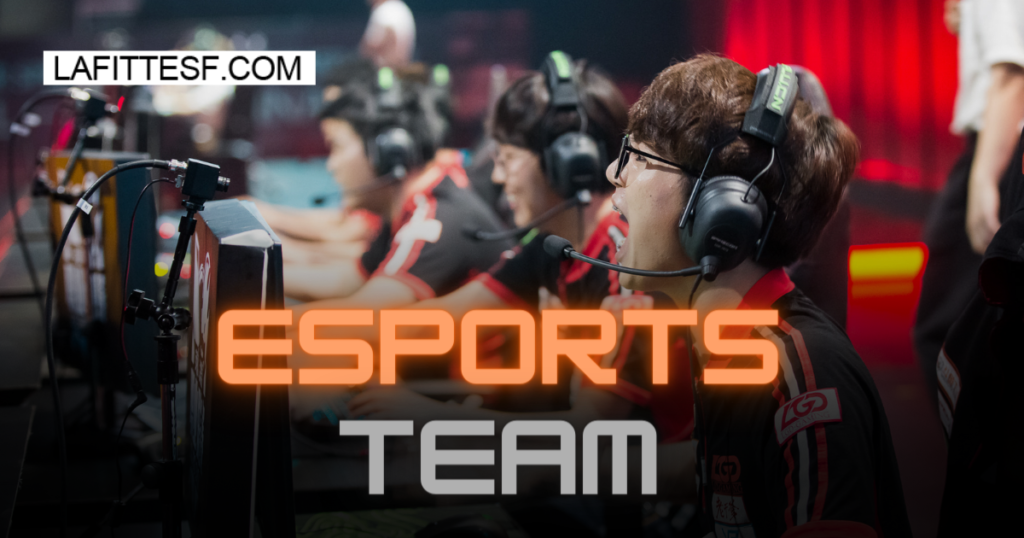Ever wondered what it takes to propel an eSports team to the summit of competitive gaming? Picture this: a group of dedicated players, honing their skills day in and day out, driven by an unyielding passion for victory.
But here’s the kicker – success in eSports isn’t just about non-stop grinding; it’s about finding that sweet spot between intense practice and crucial rest.
In this guide series, this year we’re diving headfirst into the world of eSports, uncovering the secrets to achieving peak gaming performance through the delicate art of balancing practice and rest, with a special focus on Lafittesf.
Table of Contents
Understanding the Demands
Let’s kick things off by breaking down the demands of competitive gaming. It’s not all fun and games – well, actually, it is, but you get the idea. eSports teams’ training is no walk in the park.
We’re talking about hours upon hours of strategic gameplay, lightning-fast reflexes, and split-second decision-making. It’s like trying to juggle flaming swords while riding a unicycle – okay, maybe not that extreme, but you get the point.
Now, let’s talk about the toll it takes on your body and mind. Prolonged gaming sessions can leave you feeling like a zombie – drained, exhausted, and running on fumes. And let’s not forget about the dreaded burnout.
It’s the arch-nemesis of every eSports team – the point where your passion to compete fizzles out like a damp firecracker, leaving you feeling like you’ve hit a brick wall.
Strategies for Effective Practice

Let’s delve into how to effectively practice and elevate the performance of your eSports team. It’s not just about endless gaming sessions; it’s about implementing intelligent, targeted practice methods that bring out the best in your team and distinguish you from the competition.
First things first, set clear goals for each practice session. Whether it’s mastering a new strategy, improving teamwork, or honing individual skills, having specific goals keeps you on track and motivated.
Structure your practice sessions like a well-oiled machine – organized, efficient, and covering different aspects of the game and gameplay each time. This ensures you’re making the most of your time and improving in all areas.
But don’t get stuck doing the same thing over and over. Mix it up with a variety of drills, exercises multiple games, and game modes to keep things fresh and challenging. This not only prevents boredom but also helps your team adapt and grow.
After each session, take time to review your gameplay footage, analyze mistakes, and identify areas for improvement. This self-reflection is crucial for turning good teams into great ones.
Consistency is key. Make practice a regular part of your team’s routine and stick to it. Remember, success as a team is built through consistent effort over time.
So there you have it – the ultimate guide to effective practice with your team. Set clear goals, stay organized, mix things up, review, and be consistent. Now go out there and show the world what you’re made of!
The Importance of Rest and Recovery
Let’s chat about something vital for every eSports team – taking a breather and recharging. You might be wondering, “But won’t resting set me back?” Not at all, my friend. Rest is like the secret sauce that keeps your gaming energy flowing endlessly.
Think of rest as hitting the reset button for your team and crew. It’s when your muscles recover, your brain refreshes, and you come back stronger.
And don’t underestimate the power of sleep – they claim it’s like a magic potion for your team’s brain, sharpening focus and reaction time, giving your team an edge.
But resting isn’t just about sleeping. It’s about finding balance. Take breaks, enjoy hobbies outside of gaming, and spend time with loved ones. Your league team’s mind—your league team and your game—will thank you for it.
Players and teams
In professional gaming, players often join an eSports team or larger gaming organizations. Teams like FzaClaan Cloud 9, Fnata, T2 E-sports, and Natus Vinceve have achieved success and sponsored global gaming events.
These teams compete in tournaments and leagues, showcasing their skills across different games. They also support individual players in one-on-one games, like combat games at the Evolution Championships or competitive Hearthstone matches.
Players who win major tournaments may receive extra rewards or salaries from their teams. Overall, the eSports team provides support and opportunities for players to compete at a high level, contributing to the growth of professional gaming worldwide.
Addressing Common Challenges: Overcoming Practice and Rest Obstacles
Alright, let’s tackle some of the biggest hurdles that can trip up the eSports team when it comes to the season: balancing practice and rest. These challenges ahead might seem daunting, but with the right strategies, you can power through and come out stronger on the other side.
- Time Crunches
We get it – between school, work, and all the other stuff life throws your way, finding time for practice and rest can feel like trying to fit a square peg into a round hole.
But fear not! Instead of stressing about long, marathon practice sessions, try breaking things down into shorter, more focused bursts. Quality over quantity, my friends.
- Team Drama
Let’s face it – where there are people, there’s bound to be a little drama now and then. But don’t let disagreements or conflicts throw a wrench in your practice plans.
Keep those lines of communication wide open and encourage your teammates to speak up about any issues or concerns. Remember, you’re all in this together.
- Pressure Cooker
Whether it’s from sponsors, fans, or the pressure to perform at your peak, external pressures can sometimes feel like a ton of bricks on your shoulders.
But here’s the thing – your well-being comes first. Don’t be afraid to set boundaries and prioritize rest when you need it. Your long-term success is what matters.
- Ups and Downs
Ah, the rollercoaster ride of inconsistent performance. One day you’re on top of the world, the next you’re crashing and burning. But hey, that’s just part of the game.
Instead of getting bogged down by setbacks, focus on the journey of improvement. Keep tweaking and refining your practice routine, and remember – progress isn’t always linear.
Strategies for Balancing Practice and Rest
Let’s chat about balancing practice and rest for your eSports team and crew.
Picture this: you’re gearing up for another intense gaming session, but you’re questioning, “Am I overdoing it? Should I take a break?” No worries, I’ve got your back.
First up, let’s talk about routines. Treat your practice like appointments – stick to your plan, but stay flexible if life throws a curveball.
Communication is key. If someone’s feeling burned out, speak up! Others might be feeling the same. Work together to find solutions.
And don’t forget to ask for help when needed. Whether it’s from a coach or a fellow gamer, seeking guidance is nothing to shy away from. It’s how the pros made it big.
So there you have it – the secret to balancing practice and rest for your eSports team. With a solid routine, open chat, and a willingness to seek help, you’ll be ready to rule the competition next season. Now go out there and show ’em what you’ve got!
Which is the best eSports team?
Most rated 2023 eSports Team. T1 Premier League. Legendary. #2. ONIC eSports Mobile Legend: Bang. #3 Black List International Mobile Legend: Bang. Rex – Rupum Qoen Mobile – Legend: Bang! 5.
Case Studies and Success Stories
Now, let’s take a page out of the playbook of some of the eSports team’s finest. From established League of Legends legends to Dota 2 dynamos, these teams know a thing or two about organization and finding balance. Take notes, because these success stories are worth their weight in gold.
- Team SoloMid (TSM)
TSM is a top player in competitive gaming, especially in League of Legends. What makes them stand out?
Their commitment to both practice and rest. TSM follows a strict training routine, focusing on refining their skills and strategies. But they also value rest, giving players time to recharge between sessions.
This balance has led TSM to many championship wins, showing that success in an eSports team comes from both hard work and smart recovery.
- OG (formerly known as OG Dota)
OG’s rise in the eSports team is legendary. With many wins at The International, the top event in Dota 2, OG is now one of the best teams ever.
What’s their secret? They take a well-rounded approach to training and rest. OG uses innovative methods, like intense practice matches and mindfulness exercises.
But they also know when to take breaks, letting players recharge. This balance helps OG stay successful in competitive gaming.
- Team Liquid
Team Liquid is a big name in the eSports team. They have talented players in games like Dota 2, League of Legends, and Counter-Strike: Global Offensive.
What makes Team Liquid special? They focus on personalized training. Instead of using the same plan for everyone, they work with each player to create a practice routine that fits their strengths and weaknesses.
They also know the importance of rest. By making sure players get enough rest, they keep the team strong. This mix of tailored training and rest has helped Team Liquid win many games, making it one of the best eSports teams out there.
By studying the successes of these top teams, aspiring gamers can glean valuable insights into the importance of balancing practice and rest.
From structured training regimens to strategic downtime, these case studies demonstrate that finding harmony between hard work and self-care is the key to unlocking peak performance in competitive gaming.
So, take note from the pros, and remember – success in esports is not just about what you do in-game, but also how you take care of yourself outside of it.
Conclusion
And there you have it—the ultimate guide to mastering practice and rest for your eSports team. Remember, success in gaming isn’t just about how many hours you put in the first time; it’s about how wisely you spend them.
So, go forth, conquer the competition, and remember to take a breather now and then. Your team’s body, your team’s mind, and your game will thank you for it. Happy gaming!
FAQs (Frequently Asked Questions)
- Why is balancing practice and rest important for the eSports team?
Balancing practice and rest is vital because it helps players perform better without burning out. Proper rest prevents exhaustion and keeps players sharp for competition. - How can I tell if my team is experiencing burnout?
Signs of burnout include lower motivation, increased irritability, feeling tired all the time, and worse performance in games. It’s important to watch out for these signs and talk openly about them. - What are some effective rest and recovery strategies for the eSports team?
Good rest strategies include taking regular breaks during practice, getting enough sleep, trying relaxation methods like meditation, and doing non-gaming activities for a mental break. - How can I create a balanced practice schedule?
To balance practice, set clear goals for each session and mix up training to keep it interesting. Make sure there’s time for rest and recovery between tough sessions. - What role does communication play in balancing practice and rest?
Communication helps teammates support each other and manage workload and stress. Being open about feelings and needs can prevent burnout. - How can the eSports team adapt their routines for busy times or unexpected events?
Flexibility is key. Teams can adjust practice times, shorten sessions, or focus on rest during busy periods. Being adaptable helps maintain a healthy balance.
7. What is an eSports team?
Esports are an esports subset of videogame videos which insider intelligence defines as organized games competitions by professional athletes. As with the typical sport, many esports generally have similar structures such as clubs, teams, or players.
